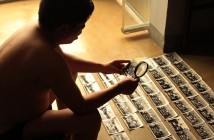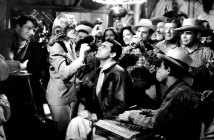
Editor’s Notes: The Boss opens in wide theatrical release today, April 8th.
The Devil doesn’t wear Prada. She prefers to wear high turtlenecks and bright, gauche business wear. She’s one part Suze Orman, one part Tony Robbins, and one part Donald Trump. She’s vulgar, crude, and narcissistic. In short, she’s a near perfect reflection of our politically perilous times. The “she” in the preceding sentence refers to Melissa McCarthy’s title character, Michelle Darnell, a onetime foster kid turned multimedia mogul (she’s the “47th wealthiest woman in America”). She’s on top of the world when we first meet her in The Boss, giving a “Greed isn’t good, it’s great” speech to a packed auditorium of eager admirers, followers, and devotees to her cult of personality. She counsels her audience to ditch any obstacles that stand between them and the pursuit of the Almighty Dollar, including their families (anchors, all of theme), neatly – probably too neatly given the inherently reductive nature of comedies – setting up the central conflict in The Boss: Work (and money) versus Family (and authenticity).
McCarthy just needs stronger, more consistent, and more cohesive material next time around.

It’s exactly the same, painful lesson Jake Gyllenhaal’s uncomfortably numb character learns in Demolition, but there the driving impulse isn’t comedy; it’s (grief) drama. Both films inevitably wend their way toward foregone conclusions (people matter, corporations don’t, family and connection above all), but The Boss takes the more scenic comedy route, first overturning Darnell’s outrageously privileged life (a life she earns, by the way) and sending her to a country club federal prison for insider trading. Darnell’s defense that everybody does it might be right (see, e.g., this week’s Panama Papers revelation), but that doesn’t save her from losing everything when she emerges from prison several months, a free woman. With nothing left and everyone in her life happy for her precipitous fall, she’s left with one option: Her onetime personal assistant and single mom, Claire (Kristen Bell). Claire initially balks at Darnell’s pleas, but her daughter, Rachel (Ella Anderson), somehow convinces her otherwise.
. . . the jokes and gags of wildly varying quality and offensiveness come and go.
In short order, Darnell does some overturning of her own, repeatedly proving herself a disruptive presence in Claire and Rachel’s life. Prone to always saying whatever crosses her profane mind, Darnell makes enemies of practically everyone unlucky enough to cross her path, including an overbearing mom who clashes with Darnell at Rachel’s Dandelions (like the Girl Scouts, but not copyrighted) meet-up. Darnell, however, sees a business opportunity in the (not Girl Scouts) cookies the girls sell. Offering a percentage of sales and contributions to their respective college funds, all Darnell needs is a product, a product she conveniently finds in Claire’s homemade brownies. Before long, Darnell and Claire are business partners, their business begins to bloom, and Darnell’s personality begins to soften, but not too much (there’s a R-rating to sustain, after all). The only real obstacle to personal and professional success lies in Darnell’s onetime lover and business associate turned business rival and enemy, Renault (Peter Dinklage).
Life lessons are learned, including the most important one (no, not family first/always): You can have it all. Ruthlessness may be a great trait in the business world, but not where personal relationships are concerned. Darnell’s path toward that realization and the resulting self-actualization takes the better part of two hours to achieve. By then, jokes and gags of wildly varying quality and offensiveness come and go. Though laced with an enviably carefree, cruel streak, the better jokes and gags aren’t particularly notable, with possibly one or two exceptions. Neither will be spoiled here, though it bears mentioning that Will Farrell’s production company helped finance The Boss. One of The Boss’ highlights will remind moviegoers of a similar highlight found Anchorman I and II, appropriately tweaked to the subject matter and the actors’ strengths. In McCarthy’s case, her fearlessness as a performer, her willingness to play deeply unlikeable characters, serve her well again. Darnell isn’t anywhere near as subversive as McCarthy’s Spy character (a brainy, accomplished analyst initially rejected for her physical appearance and gender), in large part because she’s more a broad, satirical caricature, but that doesn’t make Darnell any less memorable. McCarthy just needs stronger, more consistent, and more cohesive material next time around.
The Boss falls short of Melissa McCarthy's comedic talents. She just needs stronger, more consistent, and more cohesive material next time around.



